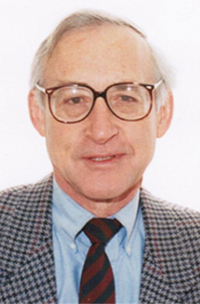In Memoriam: William R. Schell
1927-2012
by Igor Linkov, U.S. Army Engineer Research and Development Center and Jordi Vives Batlle, Belgian Nuclear Research Centre SCK-CEN

Professor William R. Schell, emeritus member of the Health Physics Society (HPS), passed away 3 January 2012. Dr. Schell joined the HPS in 1983 and participated in multiple HPS annual meetings and workshops. For over 40 years, he led state-of-the-science research in radioecology as well as in the environmental, nuclear, and chemical sciences. Schell started his career as a research scientist at the U.S. Naval Radiological Defense Laboratory in San Francisco, where he became director of the Atmospheric and Oceanographic Sciences Division, Teledyne Isotopes, Palo Alto. He then moved to the Lawrence Livermore National Laboratory (Livermore, California), where he acted as a visiting scientist for a year, whereupon he moved to Vienna to work for the International Atomic Energy Agency as director of its isotope hydrology laboratory. Professor Schell then returned to Seattle, Washington, to hold a position of responsibility in the Department of Oceanography and Department of Environmental Health at the University of Washington, becoming professor and acting director of the Laboratory of Radiation Ecology.
Having up to that point worked mainly in an academic environment, Schell decided to work in the consultancy area, with a productive eight-year period as director of research, at Northwest Consultant Oceanographers, Inc., in Seattle, Washington. In 1981-1982 he became a visiting scientist at the Center for Analytical Chemistry in the National Institute of Science and Technology in Washington, DC, and in 1982 he became a member of the Executive Committee Scientific Panel for Hudson River Foundation for Scientific Research, New York, a position he held until 1988. By 1991-1992 he was back in the academic fold, receiving the honor of being named visiting professor by the Universite Catholique de Louvain (Belgium), Institute of Terrestrial Ecology, Grange over Sands (United Kingdom), Autonoma University of Barcelona (Spain), and University of Girona (Spain).
For the final and scientifically intense part of his career, Schell moved to the University of Pittsburgh, where he took the position of professor in the Department of Environmental and Occupational Health, becoming director of the Environmental Radiation Research Laboratory. There, he worked on a pioneering project to construct a portable gas separation system for fission gases of strategic importance for nuclear arms treaty verification. He still found time to carry out extensive field sampling of contaminated lands in Belarus and to become adjunct professor in the Department of Engineering and Public Policy at Carnegie Mellon University and visiting professor in Radioecology at Kingston University, United Kingdom.
Following this final burst of creative energy, Schell retired whilst still being involved in the publication of the results of his many investigations. In recent years, he suffered a cognitive disease that took away his memories, but remained a focus of inspiration and a model of eminent scholarship for all those who had the unique privilege to work with him.




